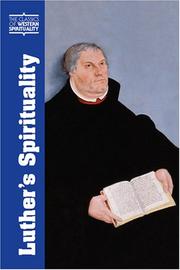| Listing 1 - 4 of 4 |
Sort by
|
Book
ISBN: 9781433187872 1433187876 Year: 2023 Publisher: New York, NY Peter Lang Publishing, Inc.
Abstract | Keywords | Export | Availability | Bookmark
 Loading...
Loading...Choose an application
- Reference Manager
- EndNote
- RefWorks (Direct export to RefWorks)
"This book focuses on Luther's very last lectures, which interpret the Joseph story in the final chapters of Genesis. Scholars have frequently neglected the later Luther and the Genesis Lectures, making this an important new contribution to the field. Luther's lectures are not a modern scientific commentary, but enarrations, as Kenneth Hagen calls them, filled with public proclamation, expanded narrative, and a performative sense of language. The author furthers Oswald Bayer's performative interpretation of Luther's theology with a more sophisticated linguistic philosophy, while continuing Bayer's theological direction. The book is an important new contribution to Luther studies, will be of interest to seminarians as well as to students of hermeneutics,homiletics, the relevance of the performative in proclamation, and philosophy of language"--
Hermeneutics --- Luther, Martin, --- Joseph --- Bible. --- Criticism, interpretation, etc.
Book
ISBN: 083089912X 9780830899128 9780830829712 0830829717 Year: 2016 Publisher: Downers Grove, Illinois : IVP Academic, an imprint of InterVarsity Press,
Abstract | Keywords | Export | Availability | Bookmark
 Loading...
Loading...Choose an application
- Reference Manager
- EndNote
- RefWorks (Direct export to RefWorks)
In this volume of the Reformation Commentary on Scripture, Philip Krey and Peter Krey guide readers with care through a diversity of Reformation-era commentary on the second half of Paul's letter to the Roman church. Among the difficult issues addressed by were the predestination of God's elect, the destiny of Israel, the role of Gentiles in salvation history, the ethical demands of the Christian life, and the Christian's relationship to the state. Here, readers will encounter familiar voices and discover lesser-known figures from a variety of theological traditions, including Lutherans, Reformed, Radicals, Anglicans, and Roman Catholics. The volume draws on a variety of resources, including commentaries, sermons, treatises, and confessions, much of which appears here for the first time in English. Gathering together these Reformation-era reflections, it provides resources for contemporary preachers, enables scholars to better understand the depth and breadth of Reformation biblical commentary and aids the ongoing transformation of the minds--and lives--of people today.
Bible. --- 227.1*1 --- 227.1*1 Brief van Paulus aan de Romeinen --- Brief van Paulus aan de Romeinen
Book
ISBN: 9780809149889 0809149885 9781587686153 Year: 2016 Publisher: New York Paulist Press
Abstract | Keywords | Export | Availability | Bookmark
 Loading...
Loading...Choose an application
- Reference Manager
- EndNote
- RefWorks (Direct export to RefWorks)
Martin Luther (1483 1546), the great German Church reformer, is often erroneously seen as someone who suddenly made a complete break with Catholicism and started his own denomination. Nothing could be further from the truth. Rather than intending to break with Catholicism, Luther sought to purge the Church from what he rightly as more recent research has acknowledged saw as abuses, above all the sale of indulgences as if one could buy one s way into heaven. The Catholic Luther presents seven writings by Luther that demonstrate his deep Catholicity. The Magnificat Put into German and Explained displays his (lifelong) devotion to the Virgin Mary; the Sermon at Coburg shows how he continued to value the devotion to the saints for evangelical purposes; and the treatise on the Lord's Supper from 1519 demonstrates Luther s nonpolemical and rich eucharistic piety in particular and a sacramental piety in general. Another eucharistic text, one each on the sacraments of baptism and of penance, and a sermon on preparing to die round out the collection. Prominent Luther scholars Philip Krey and Peter Krey offer an extensive introduction to this aspect of Luther s work along with brief introductions to each of Luther s texts. For Catholics and Protestants alike who are interested in coming to know this little known and genuinely appealing side of Martin Luther, The Catholic Luther is an indispensable resource.

ISBN: 9780809105144 9780809139491 Year: 2007 Publisher: New York Paulist Press
Abstract | Keywords | Export | Availability | Bookmark
 Loading...
Loading...Choose an application
- Reference Manager
- EndNote
- RefWorks (Direct export to RefWorks)
| Listing 1 - 4 of 4 |
Sort by
|

 Search
Search Feedback
Feedback About UniCat
About UniCat  Help
Help News
News